Submission of Undergraduate thesis!!
Following last week’s three master’s students, three fourth-year students also submitted their graduation theses today!
As this was their first research project and thesis writing, I imagine it was challenging with many unfamiliar aspects. However, I believe all three persevered tenaciously through both the analysis and writing until the very end. Seeing their approach was truly inspiring!
I hope they give their best at the final presentations to convey a year’s worth of achievements to the faculty!
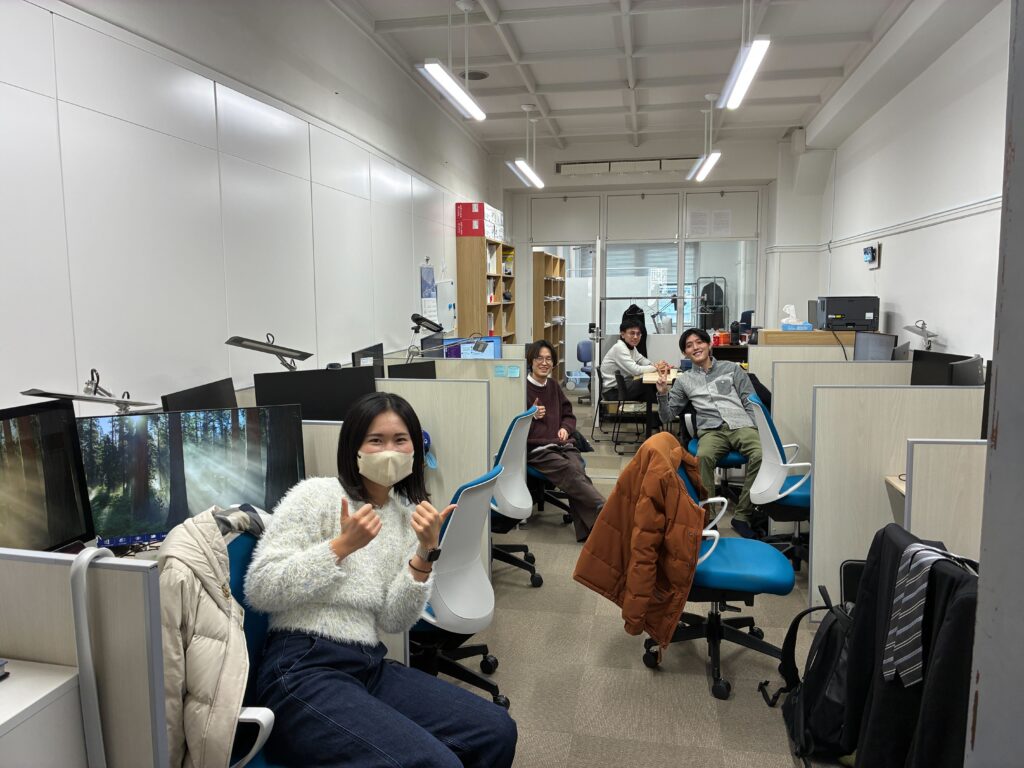

[M1 Tanaka]
M2 students have successfully submitted their master theses!!
All M2 students, Uemachi-sann, Mega-sann, Watanabe-sann, have just successfully submitted their master’s theses!!
“Even though I struggled until the very last minutes, I managed to submit successfully thanks to support from everyone!! I’ll keep working hard on preparation for the final presentation!!”(Uemachi-sann)
[M1 Tanaka]
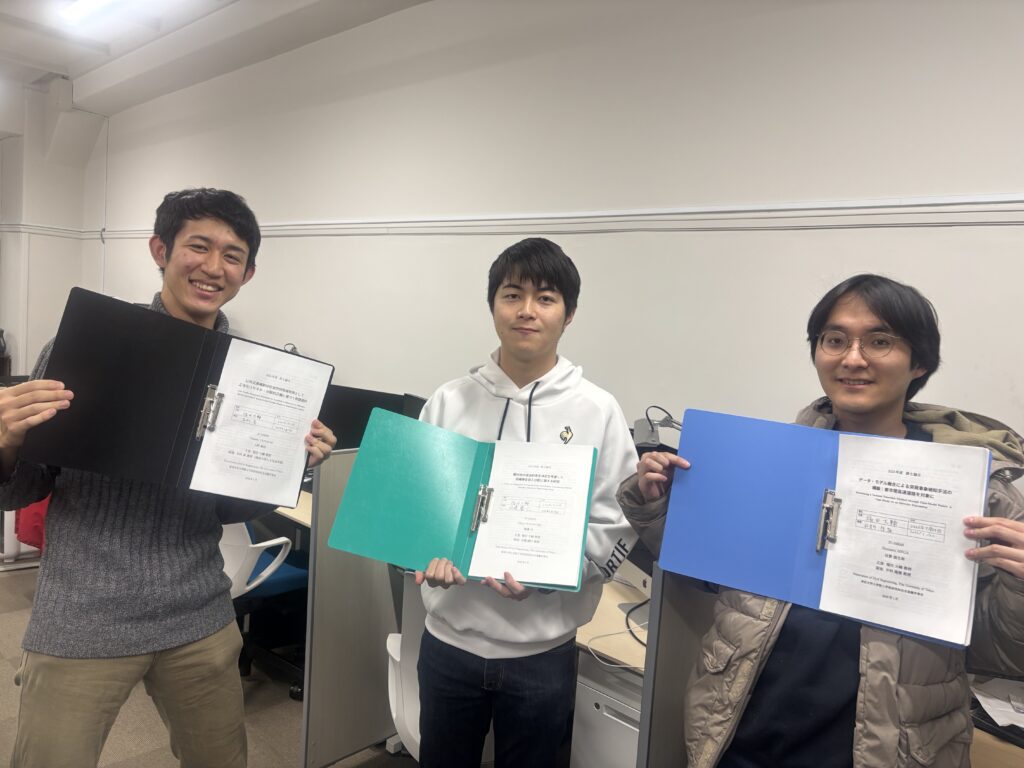
We wrapped up the lab seminar in the fall semester !
As the year draws to a close, I hope everyone is doing well.
Our lab recently wrapped up our fall semester seminars and deepened our bonds over a hot pot gathering afterward.
During the last two seminar sessions, B4 and M2 members presented their current thesis progress and chapter outlines, sparking lively discussions, particularly about structuring the thesis narrative.
The time has finally come to begin writing the main body of the thesis, and there is less than a month left until the submission deadline.
We sincerely hope that all B4 and M2 students will successfully complete their theses and be satisfied with them!
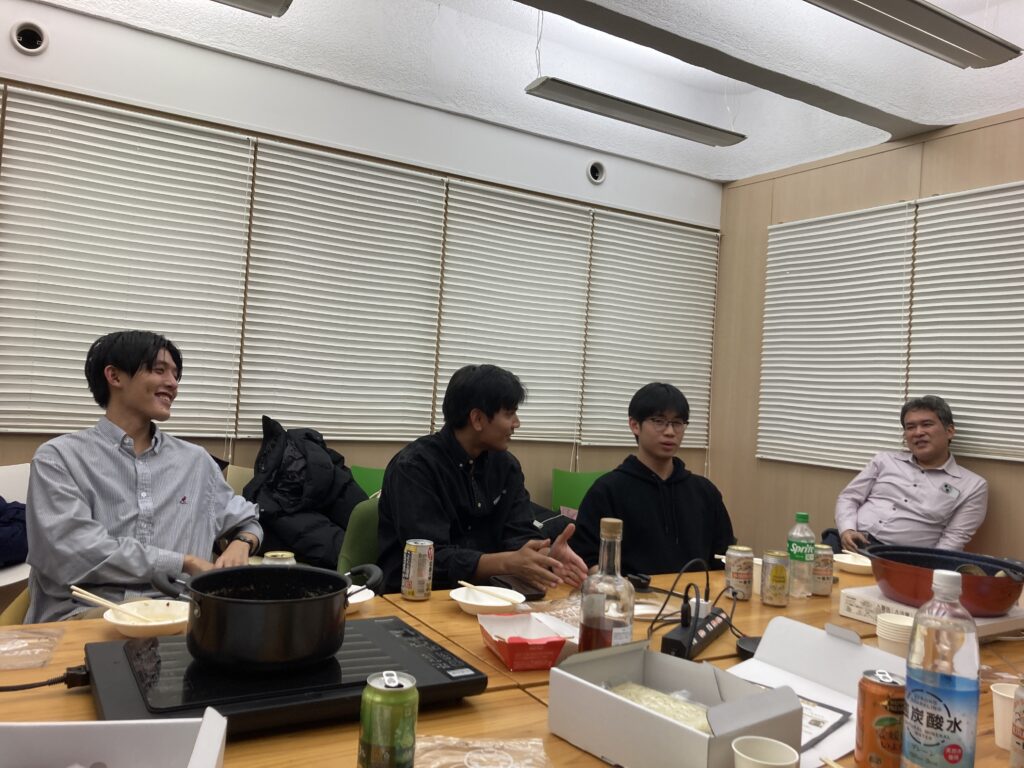
[M1 Tanaka]
Participation in an international conference(IEEE-ITSC 2025)
I am Shuntaro Tanaka, an M1 student.
I participated in IEEE-ITSC (Intelligent Transportation System Conference) 2025 held in Gold Coast, Australia, and gave an oral presentation titled “Development of a Deep Learning-Based Hybrid Calibration Method for Large-Scale Activity-Based Travel Simulator Using Passive Aggregate Population Data.”
IEEE-ITSC is an internationally renowned conference in the field of advanced transportation systems. Beyond transportation planning, I heard many presentations on areas different from our usual focus on traffic flow theory and travel behavior modeling, such as information and communication technologies related to autonomous driving and traffic data observation techniques. This provided an opportunity to broaden my horizons.
Furthermore, within the travel behavior modeling field, I was greatly stimulated by exposure to new methodological trends, such as the utilization of large-scale language models.
During the presentation session, I received detailed questions, particularly regarding methodological aspects, such as the detailed network design of the developed deep learning model and comparative verification using other deep learning techniques. I intend to use this feedback as a reference for future research development.
I would like to take this opportunity to express my gratitude to Professor Fukuda for providing me with this valuable opportunity to present at an international conference.
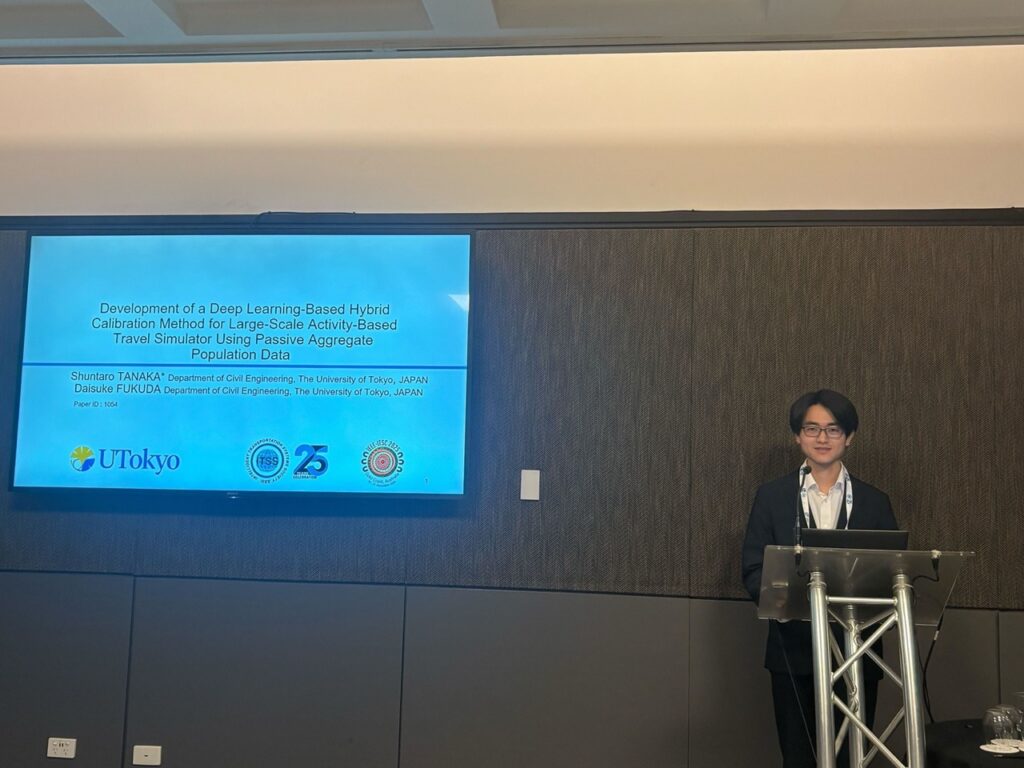
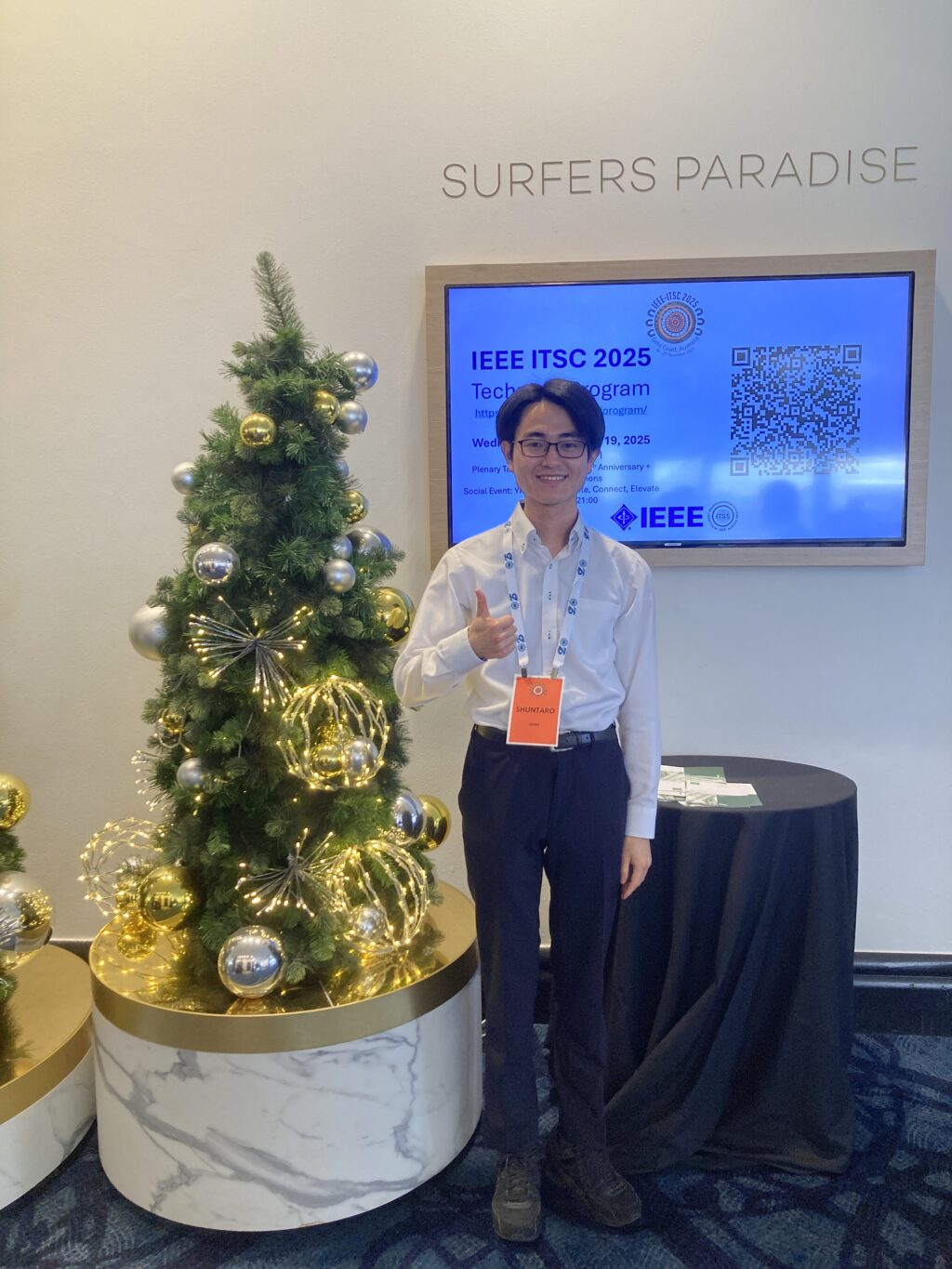
[M1 Tanaka]
Professor Hai Vu from Monash University visited our laboratory as a visiting professor.
As the year draws to a close and the cold season sets in, I hope you are keeping well.
Our laboratory welcomed Professor Hai Vu from Monash University as a visiting professor from late November to mid-December.
Professor Vu was also the supervisor at the host institution during Tanaka’s research stay. We were delighted to continue our discussions with him both during his visit and after his return.
Professor Vu’s current research themes at Monash University span a wide range, including traffic state estimation and large-scale urban mobility simulation through the integration of autonomous driving control and traffic engineering theory with machine learning methods. Many of these themes align closely with our students’ research topics.
Consequently, the discussions held during our lab seminars, international project group seminars, and individual meetings with students proved to be extremely meaningful and valuable opportunities for us.
We look forward to building a long-term collaborative relationship moving forward.
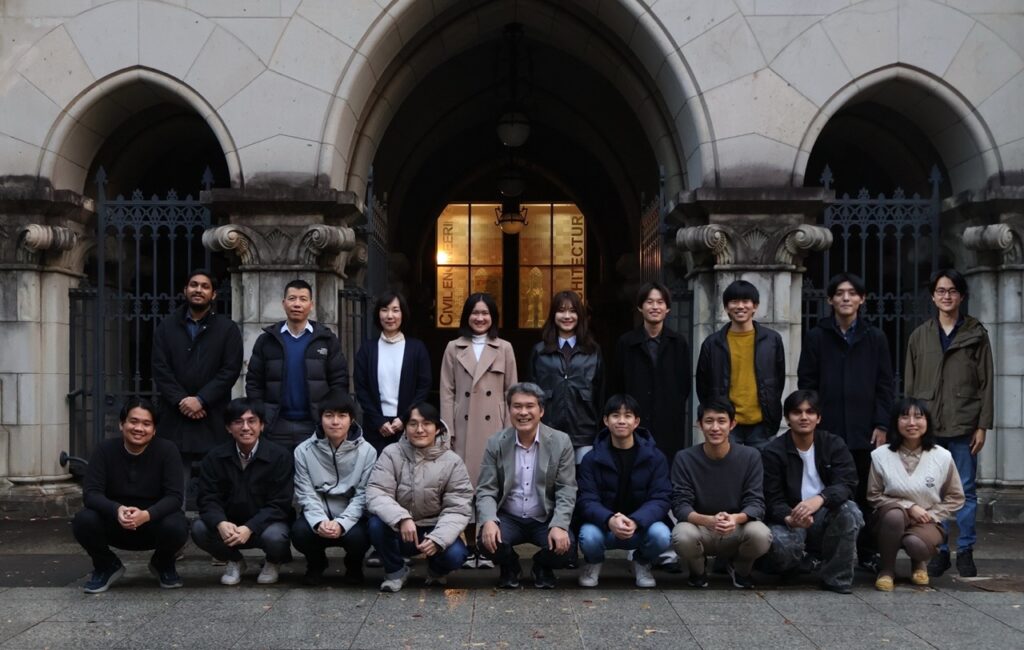
[M1 Tanaka]
“Musha-Shugyo” Program(Abroad research stay program) @Monash University
I am Shuntaro Tanaka, an M1 student.
From late September to mid-November, I spent nearly two months at Monash University’s Institute of Transportation Study in Melbourne, Australia, conducting research under Professor Hai Vu. My research theme was “Development of a Reverse Reinforcement Learning-Based Travel Activity Modeling Method Considering Human Heterogeneity” as part of a research training program.
During my stay, Professor Vu provided opportunities for regular meetings and student group seminars to discuss ideas for literature reviews and methodological frameworks. We deliberated on defining the research problem and developing potential methodologies. Additionally, I analyzed data provided by Professor Vu covering Victoria, including Melbourne.
During these discussions, I received extensive feedback on the differences in social contexts affecting mobility patterns in both Melbourne and Tokyo, as well as insights into what elements could be captured in the mobility survey data and methodologies of both cities.
While some other students’ research covered topics closely related to our lab, many explored entirely new areas, such as combining large language models with existing mobility activity models. This was highly stimulating. Furthermore, within the seminar, discussions consistently focused on how to compare and validate results, always keeping the final paper output in mind. I felt this was something I wanted to emulate in my own research.
During my days off, I also enjoyed sightseeing in Melbourne’s city center and suburbs. It was fascinating to learn about various aspects of the city, such as its diverse food and café culture supported by cultural diversity, and the progress of railway projects responding to the city’s population growth.
I intend to apply the knowledge and insights gained during this research stay to my future master’s research.
Finally, I would like to express my gratitude to Professor Hai Vu and the students at Monash University, Professor Fukuda who introduced this opportunity, Professor Takao Danji of Waseda University, and the International Exchange Team of the Graduate School of Engineering who supported my travel through the Musha Gyōshū Program, as well as everyone else who supported this research stay.




[M1 Tanaka]
The Research Visit at Bangkok
This is Saratani, a B4 student.
From the end of October to the beginning of November, I visited Bangkok, Thailand, as part of my graduation research. My research focuses on environmental policies in Bangkok, and I will conduct a questionnaire survey on residents’ energy-saving behaviors from late November. During this visit, I conducted a pilot survey with students and research assistants in Prof. Veera’s laboratory at Chulalongkorn University to prepare for the main survey. We also held a meeting with a local survey company that will collaborate with us in the project.
In the pilot survey with the students and research assistants, I asked them to answer the questionnaire and discussed its contents with them. I received very helpful feedback, ranging from the questions and answer options to detailed linguistic expressions. By refining the survey design based on this feedback, I expect the main survey to become more effective and accurate.
In the meeting with the survey company, we finalized the detailed survey plan and schedule, which helped clarify the outlook for my research.
Furthermore, I was able to experience firsthand the atmosphere of Bangkok, which I had previously only known through literature and documents. While this may not be directly reflected in my research, I believe it was a valuable experience for my personal development.
Lastly, I would like to express my sincere gratitude to Prof. Veera, the students in the laboratory, the staff members at the project office, and the professors who accompanied me on this trip from Japan.
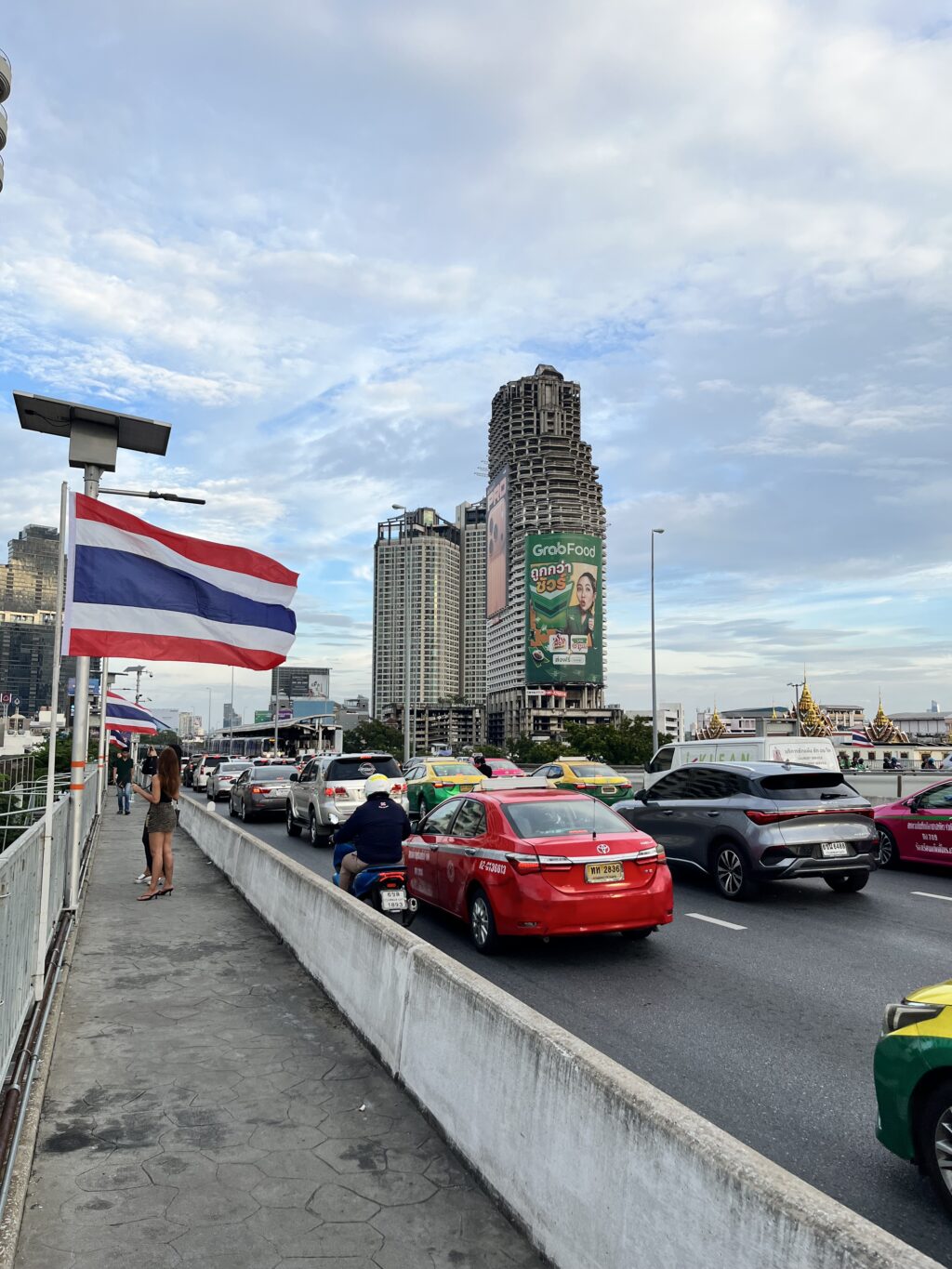
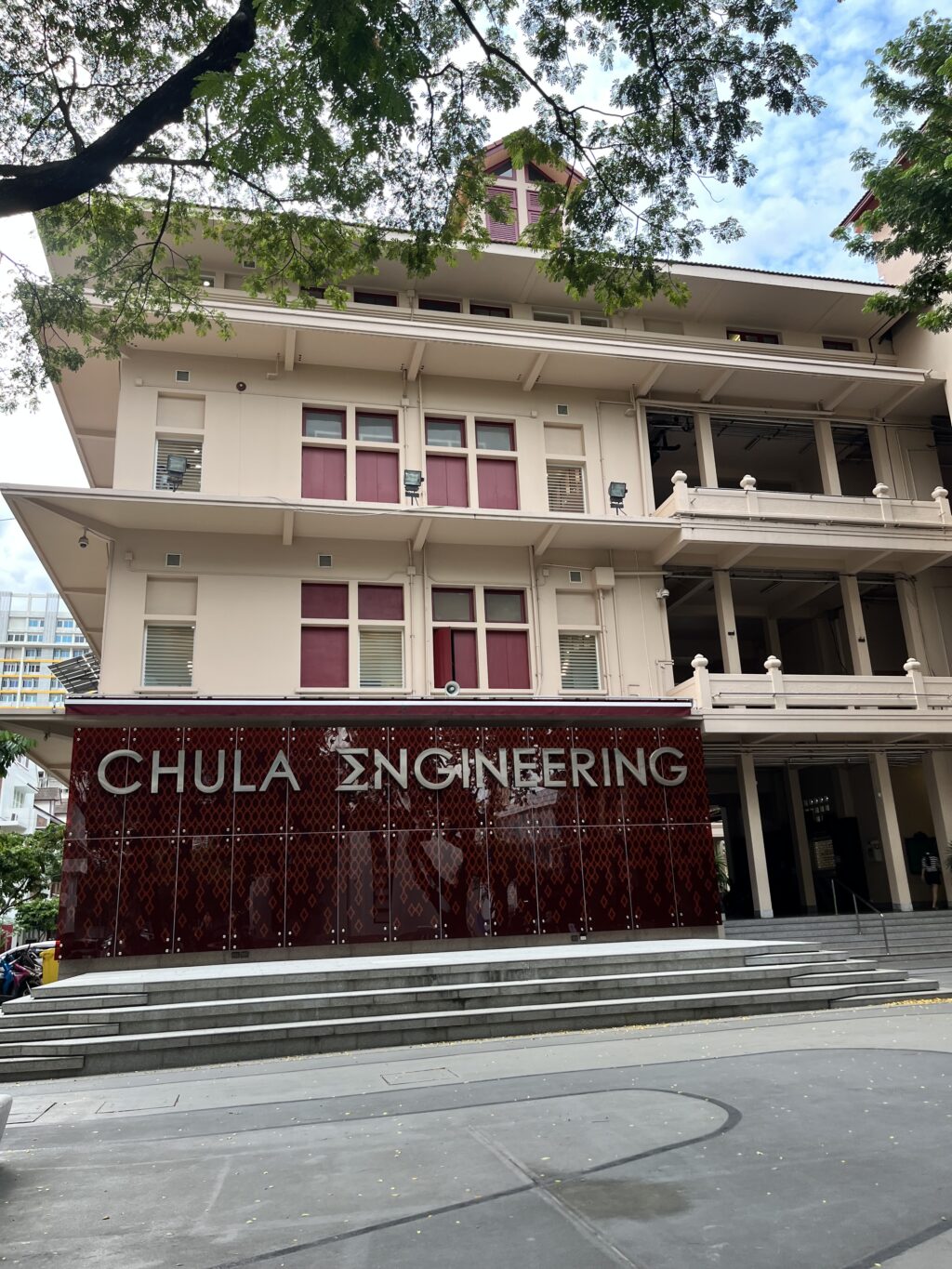
[Saratani]
Participation in HAI 2025
We participated in the 13th International Conference on Human‑Agent Interaction (HAI 2025), held at the Keio University Hiyoshi Campus. One of our alumni, Ms. Kaori Nakamura, presented a poster based on her master’s thesis titled “Endogenous Formation of Collective Behavioral Patterns of Human-Autonomous Mobility Interactions in Mixed-Use Traffic Environments.”
Her research used evolutionary game theory to dynamically investigate how efficient behavior between automated vehicles and human agents can be promoted under varying regulatory and environmental conditions. We would like to thank everyone who asked questions during the poster session, and the organizing professors for hosting the forum.

[Uemachi]
| Conferences Lab Life by Students
Message from Our New Member – Associate Professor Dr. Lubing Zou
I’m Lubing Zou, a new assistant professor who started in October.
I come from China, and came to Japan in 2018. After completing my Ph.D. in 2023, I worked as a researcher in a private company in Japan for about two and a half years. And now I return to academia.
My current research focuses on human–machine interaction in future mixed traffic, drawing on psychology and transportation fields.
I hope my experience can be helpful to all students, and I’m looking forward to enjoying the fun of research together with everyone.
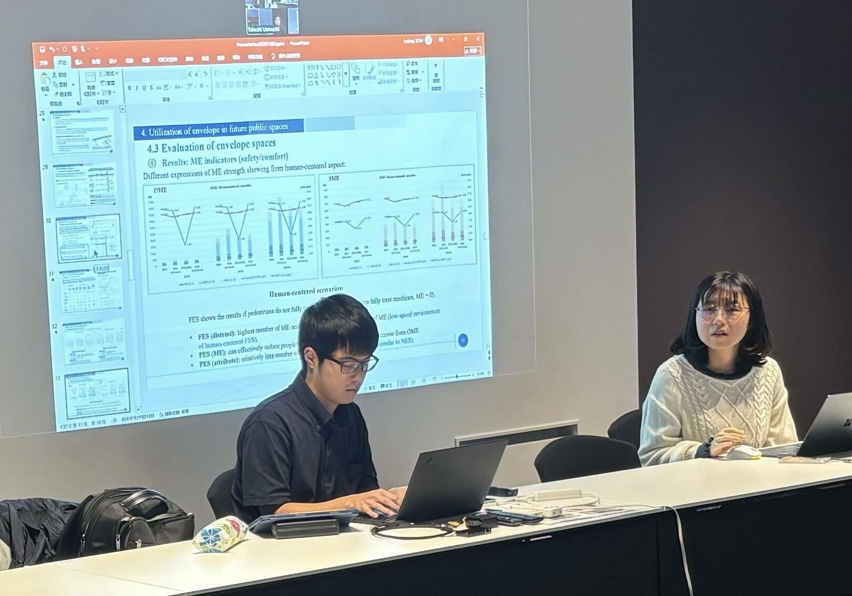
[Lubing Zou]
Joint Lab Trip to Nasu 2025
Our annual group trip to Nasu was held jointly with the International Project Laboratory, continuing a long-standing tradition.
This year, the trip was organized by the first-year master’s students from our lab, who prepared a wide range of fun activities for everyone.
The trip began with a visit to a local winery, where we enjoyed tasting a variety of wines. In addition to the classic grape-based wines, we had the rare opportunity to sample special selections such as wines offered to the Imperial Villa and unique varieties made from plums, or even milk—a truly refined experience we don’t often encounter.
In the evening, we held a barbecue dinner at our accommodation, just as we did last year.
Since the International Project Group includes students from diverse national and cultural backgrounds, special attention was given to dietary preferences and restrictions. Thanks to the organizers’ thoughtful planning, we were able to enjoy a wonderfully inclusive barbecue, with a wide range of ingredients that everyone could savor while also having fun preparing the food together.

On the final day, we visited a nearby orchard for apple picking. It was delightful to see both students and professors carefully inspecting each apple in search of the best ones—a side of everyone quite different from our usual research setting!
With participants from different laboratories, countries, and academic years, the trip offered a perfect opportunity to discover new charms of Nasu and deepen friendships with people we don’t usually get to talk with.
A big thank-you to members who planned and organized this wonderful trip!

[Uemachi]



